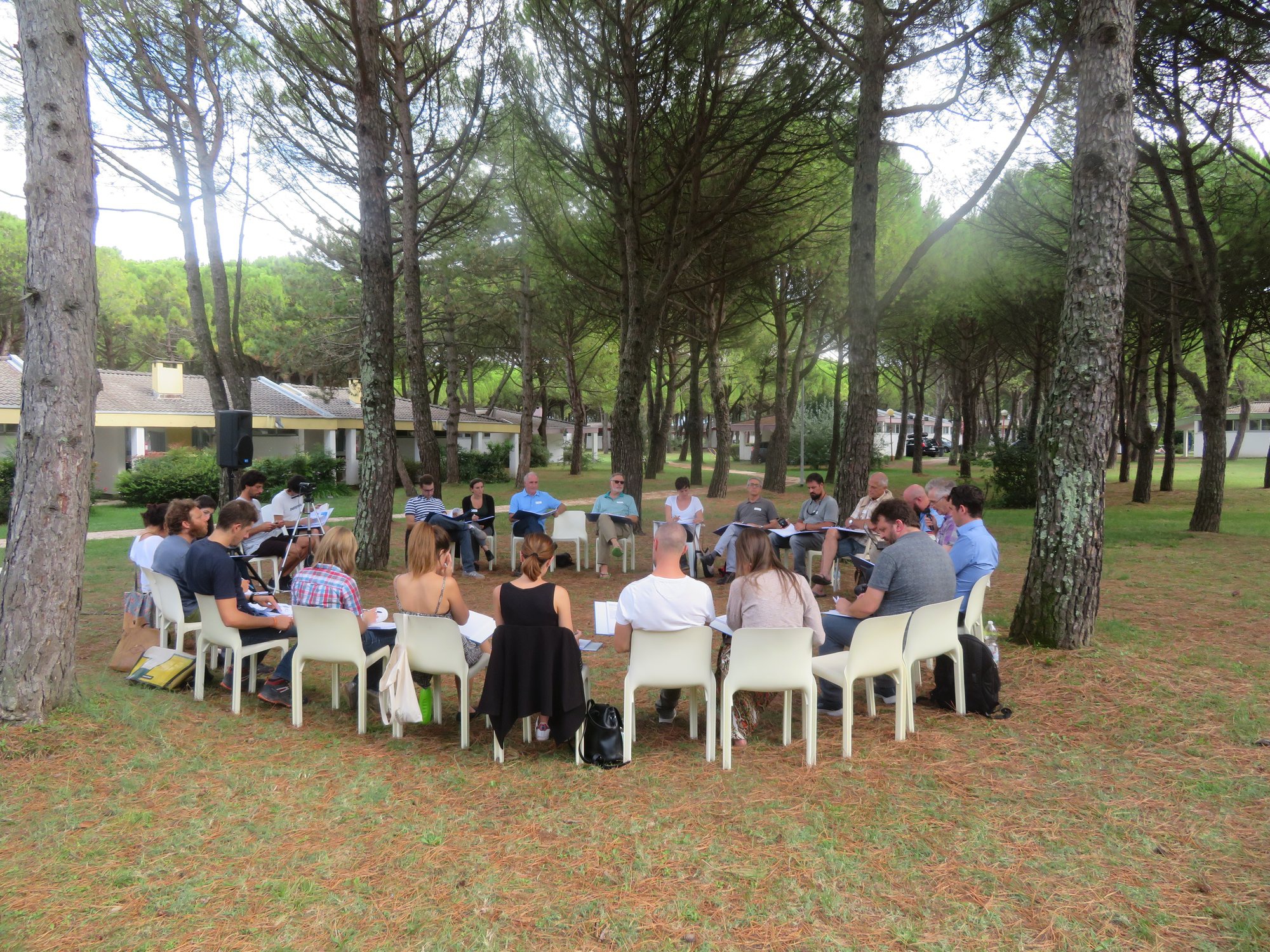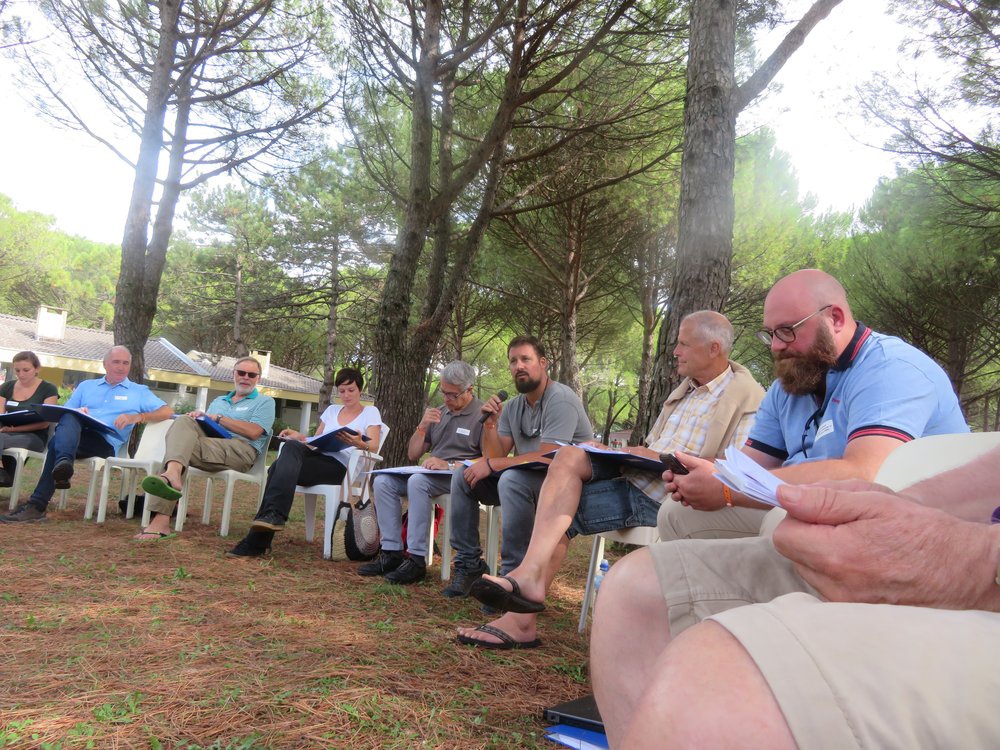
2nd Summer Shoal 2018: continued success
Fish welfare should become a criterion in certification schemes. Training of staff in knowledge of the natural species-specific needs of the farmed fishes is a prerequisite to improve fish welfare along the whole life cycle, including humane slaughter. Operational indicators and protocols for farmers are needed, based on more publicly funded and published research and on development in cooperation with the industry. Farmers are dedicated, their doors are open for good advice. These are some of the main points the 28 participants from 11 countries agreed upon, in an open dialogue among experts from science, aquaculture, authorities and fish welfare NGOs, meeting in the first days of September at the northernmost coast of the Mediterranean.
Stakeholder dialogue is a basic principle of the organisers of the Summer Shoal, the fair-fish international association[1] together with its Fish Ethology and Welfare Group[2]. The participants profited from the special conference setting in one big circle under pine trees in a lodge at the beach of Marina Julia, Monfalcone, in northeastern Italy. This atmosphere was designed to tear down walls and build bridges between representatives of interests which are often perceived as antagonistic, in order to identify joint paths to improve fish welfare.
The scientific approach
In the first session, scientists presented their results in fish welfare studies. After a short introduction in the work of fair-fish international by its president Billo Heinzpeter Studer, later explained in details with a poster on FishEthoBase, Lluis Tort, professor at the Universitat Autonoma de Barcelona (UAB), Spain, summarised his decade-long work under the title “Healthy Fish, a relationshipbetween environment, immunocompetence, stress, and behaviour”. Pablo Arechavala-López from the Mallorca based Institut Mediterrani d’Estudis Avançats(IMEDEA) and member of the FishEthoBase research team, gave the essential of a new book chapter by his team on “Domestication and fish welfare”. Øyvind Øverlifrom the Norwegian University of Life Sciences (NMBU) inducted the audience in “The concept of stresscoping styles and welfare of fish in aquaculture” and, representing his colleague Marco Vindas who had an accident, exemplified the concept under “Behavioural inhibition and chronic stress in salmonids: the role of the serotonergic system as a welfare indicator”. Finally, Leonor Galhardo, lecturer at the Instituto Superior de Psicologia Aplicada(ISPA), Lisbon, underlined the way still to go “From fish health to fishwelfare”.
The industry approach
The second session was introduced with some critical remarks by Paul Denekamp, board member of the Dutch NGO Vissenbescherming, on “Possibilities for the development of natural behaviour of fishes in aquaculture and about the importance of fish pleasure”. Andrea Fabris, directorof the Associazione Piscicoltori Italiani (API) outlined “Good management practices in fin fish farming, fish health, and welfare”. Billo Heinzpeter Studer reported an interview with Sebastian Rider, assistant manager of Swiss Alpine Fish AG, on “Do RAS pose greater fish welfare problems for salmons than other systems?” Another Swiss project was presented by Georg O. Herriger, president of the board of SWIFISH AG: “The vision of near-natural reproduction of Pike perch”. Finally, Maria Filipa Castanheira, researcher at the FishEhoBase, draw first conclusions of “Visits on Friend of the Sea certified farms with the aim of improving fish welfare. In order to confront the reality with the public expectations, Douglas Waley, fish welfare programme leader at the Eurogroup for Animals, Brussels, presented a coffee break poster on the “Perceptions of fish welfare in European civil society”, based on the results of a recent survey in several countries.
The second session ended with group and plenary discussions on key issues in fish welfare and solutions to be addressed, the results of which are summarised at the beginning of this article.
The approach of certification and legislation
A specific session was dedicated to the welfare issues at slaughter. Krzysztof Wojtas, Head of fish policy at Compassion in World Farming (CIWF), UK, presented the details of “The welfare of fish at the time of slaughter”, while Alessandra Paolini from the Welfare Unit at the Istituto Zooprofilattico Sperimentale dell’Abbruzzo e del Molise, Italy, presented research projects on the “Welfare of crustaceans and cephalopods at the time of slaughter” whose funding unfortunately has not been secured yet.
In groups and in the plenary, two questions were discussed: Which are the main barriers for the application of humane slaughter, and how could we surmount them? Main arguments were: There is a lack of rules, and a lack of political goal-setting, given the example of the EU commission which recently postponed to fix the principle of humane slaughter that would foster lacking research and development. A principle should be fixed that once a solution for a species and a farming system is at hand, it should become mandatory within due transition period. The method must reflect as well worker’s security and product quality, and it must be made viable also for small farms. Farmers with a solution in operation should divulge it to colleagues. Also, there is a need of raising the awareness of the public and of retailers, not least to assure public funding for investments needed.
Broadening the scope to fisheries
The last session was a first attempt to integrate also welfare in fisheries into the Summer Shoal programme. A first workshop focussed on catch methods and the way fishes have to end their lives, stimulated by four short inputs. Paul Denekamp gave a general introduction into the problems to be solved. Mario Passoni dived into some examples for “Lack of attention to fish welfare in fisheries”. Billo Heinzpeter Studer resumed the development of the fair-fish standard for artisanal fisheries, stipulating short capture duration and instant stunning and killing, developed together with artisanal fishermen in Senegal a decade ago. Finally, Janika Lutz explained the Fish Test developed by fair-fish international, a tool for consumers based on the species, the catch zone, the gear used, the eventual label, and the frequency of the consumer’s individual fish consumption, as an alternative to the common fish recommendation lists which do neither reflect fish welfare at the time of the catch nor the consumer’s contribution to overfishing.
The last workshop shed light to the welfare of the persons at work in fisheries. Billo Heinzpeter Studer referred to the experiences made during the fair-fish project with artisanal fishermen in Senegal by which fair-trade criteria were developed and certified in 2007. Since then, still no other fair-trade certification scheme has shown up with auditable criteria for fisheries, although for developing countries fish as a commodity is as important as the sum of all other fair-trade certified food and luxury food products. Meanwhile the depletion of fish stocks in developing countries for the markets in industrial countries continues, with severe consequences for local fishermen, workers in local fish factories, and the supply to local consumers. As a first step towards “More fairness in international fish trade”, fair-fish Switzerland started a campaign to “Give the fish back into the hands of local fishermen and fish factories”. The campaign invites retailers to source fish from developing countries only if caught and transformed by local people, in order to keep the added value and thus the labour in the country of origin, and to reduce the economic reasons behind migration. It is planned to broaden the campaign on European level in a second step, in order to influence the so-called „external function“ in the next reform of the Common Fishery Policy.
[1]fair-fish international is a Swiss based association founded in 2010. Its main purpose is to provide the expert groundwork on fish welfare, fair-trade and sustainability in fisheries and aquaculture for campaigning organisations like fair-fish Switzerland. Its major project started in 2013 with the fish ethology database FishEthoBase, representing all scientific findings on the aquatic species farmed so far, based on which it issues recommendations for farming practice. In 2018, fair-fish international started a project to develop welfare criteria for the international certification scheme Friend of the Sea, funded by The Open Philanthropy Project.
[2]The Fish Ethology and Welfare Group is a fair-fish spin-off, created in 2018 under the partnership between fair-fish international and the Centro de Ciéncias do Mar(CCMAR) inFaro, Portugal. This Faro based group of currently six researchers from five European countries will continue the work of the FishEthoBase, provide consulting and training services withinthe frame of its FISHCARE project, and conduct own experiments in the facilities of the partner institutes of fair-fish international, at the CCMAR and at the Mallorca based Institut Mediterrani d’Estudis Avançats(IMEDEA).
